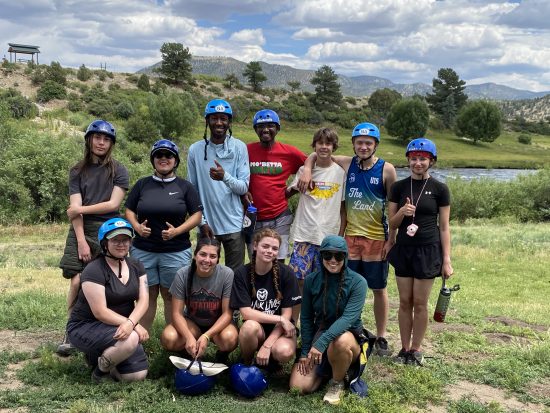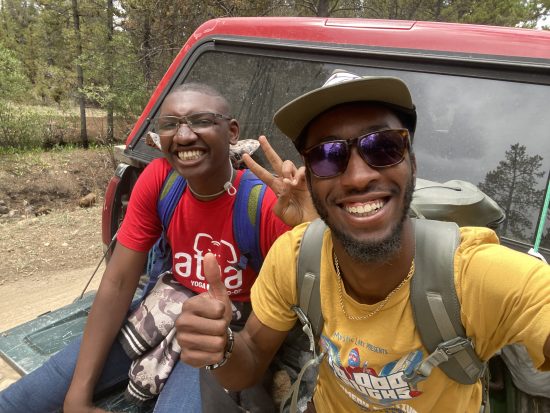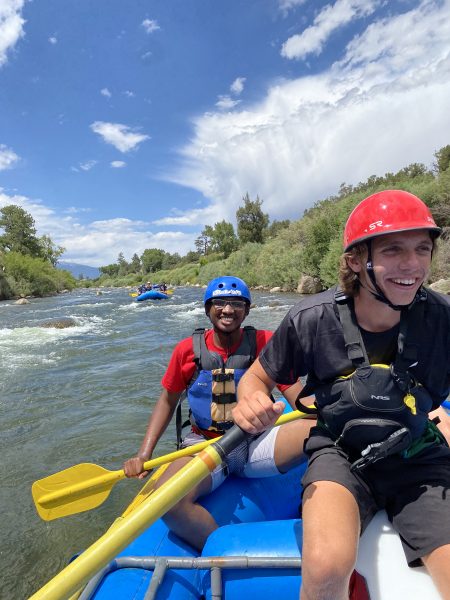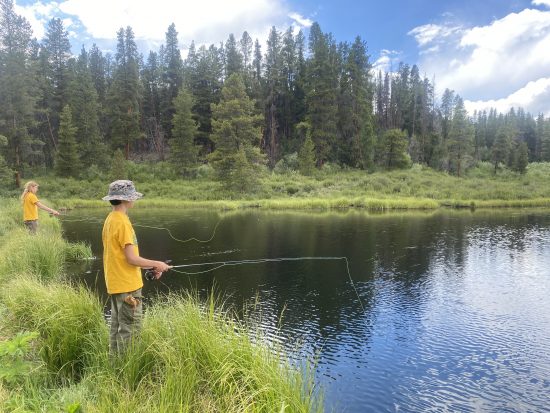
Cottonwood Institute teamed up with folks from Lincoln Hills Cares on a program all about the Colorado watershed. Written by Field Instructor M Tormasi.
As July came to a close, Cottonwood Institute teamed up with folks from Lincoln Hills Cares on a program all about the Colorado watershed. With fishing, rafting, bug catching, and an educational relay race on our itinerary, we were in for a boat load of fun! Leadville’s mountains served as our perfect backdrop at camp at the Colorado Outward Bound School campus. Stunning views of Mt. Elbert’s crater, a small creek nearby, and distant sounds of coyotes in the night will live in our memories of this campsite.

On our first day, we successfully set up camp before the darker clouds arrived. Our luck was evident as those same dark clouds merely drizzled on us, later dispersing to display a rainbow! We joyfully celebrated the good weather while eating dinner and staring at the horizon. Our new team flag had been hung up, we’d discussed our comfort zones and desired group norms, and finished our evening with a campfire.
Day two kept us on our toes as we bounced from activity to activity. We began the day learning about the meaning of watersheds, and that the nearby Arkansas river’s water eventually made its way to the Atlantic Ocean. Our educational relay race helped iterate all of the folks who depend on that water, and the many ways it is used. We soon left our campsite for a tour of the National Fish Hatchery, where we learned about local history and the greenback cutthroat trout. After an excellent tour, we were given the opportunity to feed the hatchery’s fish.
Continuing our day of discovery, we hiked to a small lake and stream. Funny enough, that same stream was feeding the creek that flowed through our campsite! Our team split into small groups to learn about fly fishing and macro-invertebrates. We also took some time to test the quality of the water and were excited to learn just how clean it was! The diversity of species we noticed coupled with our water quality tests allowed us to hypothesize that this wetland habitat is quite healthy. It was exciting to learn that this water is very clean despite Leadville’s prominent history of mining. Our group was able to clearly observe the ecological importance of conservation and reclamation work in the area.
 The following day allowed everyone the chance to cool off as we travelled south to Buena Vista with the goal of rafting through Browns Canyon National Monument. For many folks in the group, this would be their first experience whitewater rafting. The anticipation for this activity was high, and our time on the water lived up to the hype! Highlights of our trip included staring down at the river bed through clear water, floating by cottonwood trees and fascinating rock formations, and gracefully gliding through swells of whitewater. Taking on this challenge of whitewater rafting as a team enabled us to grow even closer. We were very proud of our abilities to communicate and support each other as we tackled something new.
The following day allowed everyone the chance to cool off as we travelled south to Buena Vista with the goal of rafting through Browns Canyon National Monument. For many folks in the group, this would be their first experience whitewater rafting. The anticipation for this activity was high, and our time on the water lived up to the hype! Highlights of our trip included staring down at the river bed through clear water, floating by cottonwood trees and fascinating rock formations, and gracefully gliding through swells of whitewater. Taking on this challenge of whitewater rafting as a team enabled us to grow even closer. We were very proud of our abilities to communicate and support each other as we tackled something new.
Our culminating activity was a service project near Turquoise Lake. We met up with a pair of local ranch owners who are consistently facilitating conservation projects for Leadville. This was our chance to give back to them! We were able to install more than 10 new signs to help inform nearby campers of the importance of the irrigation ditch for local ranchers and livestock. These informative signs will have long lasting positive affects by discouraging campers from littering and damming the ditch. Our team also collected litter, contributing to cleaner campsites and a healthier ecosystem for wildlife.
After a week full of recreation, service, and connecting with nature, our team had one last campfire to reflect on how far we had come. We discussed the new information we’d learned, our favorite moments, and reasons we were proud of ourselves. Many folks were excited about utilizing their recently-practiced outdoor skills on future trips. By conversing with locals, trying new ways to recreate, and spending time bonding at nightly campfires, our group successfully grew our connections to nature while learning about the importance of the Colorado watershed.
Huge thanks to the Walton Family Foundation for funding the creation of the Watershed Project curriculum!
If your student enjoyed our trip, you can help support us by making a donation or becoming a monthly Seedling member.

